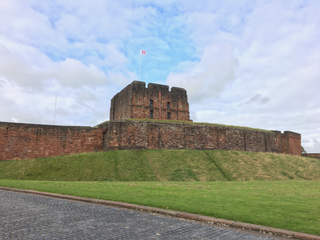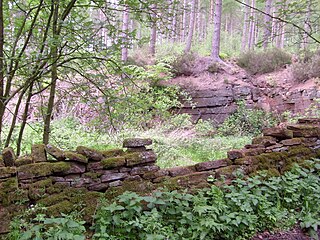
Robert de Vieuxpont (died 1227/8) (aliasVipont, also Veteripont Latinized to de Vetere Ponte ("from the Old Bridge")) was an Anglo-Norman landowner and administrator in the north of England.

Robert de Vieuxpont (died 1227/8) (aliasVipont, also Veteripont Latinized to de Vetere Ponte ("from the Old Bridge")) was an Anglo-Norman landowner and administrator in the north of England.
He was born the younger son of William de Vieuxpont and his wife Maud de Morville.
He entered royal service and was initially employed in Normandy as a paymaster of troops and director of military works, including those on Rouen Castle. He was rewarded in February 1203 by being given custody of Appleby Castle and Brough Castle, to which the lordship of Westmorland was added a month later, together with the office of Sheriff of Westmorland, to be held in perpetuity by his heirs.
After returning from Normandy with King John in late 1203 Vieuxpont became increasingly involved in northern administration. In October 1204 he became High Sheriff of Nottinghamshire, Derbyshire and the Royal Forests including control of Nottingham Castle, an important power base and store of the royal treasury. In 1206 he was a justice and assessor of tallage in the northern counties, in 1207 he was given custody of the See of York, and in April 1208 custody of the See of Durham. From 1210 to 1216 he was Sheriff of Devon and from 1210-1213 Sheriff of Wiltshire. He was highly trusted by King John, who put in his care both his treasury, his son Richard and his niece Eleanor, Fair Maid of Brittany. In 1216 he was also entrusted with the custody of Carlisle Castle, and from 1217 to 1222 was appointed Sheriff of Cumberland. He successfully defended his extensive landholdings from Scottish depredation, and built Brougham Castle in the process.
In 1213 he married Idoine de Builli, the daughter of John de Builli, a descendant of Roger de Busli, which match brought him more land and honours. By Idonea he had children:
In 1227 he bequeathed his body and his estate at Wycombe in Buckinghamshire, to the Knights Templar, and died at some time before 1 February 1228.

Carlisle Castle is situated in Carlisle, in the English county of Cumbria, near the ruins of Hadrian's Wall. The castle is over 900 years old and has been the scene of many historical episodes in British history. Given the proximity of Carlisle to the border between England and Scotland, it has been the centre of many wars and invasions. During the Jacobite Rising of 1745–6, Carlisle became the last English fortress to undergo a siege. The castle was listed as a Scheduled Ancient Monument on 7 August 1996.
Peter de Montfort of Beaudesert Castle was an English magnate, soldier and diplomat. He is the first person recorded as having presided over Parliament as a parlour or prolocutor, an office now known as Speaker of the House of Commons. He was one of those elected by the barons to represent them during the constitutional crisis with Henry III in 1258. He was later a leading supporter of Simon de Montfort, 6th Earl of Leicester against the King. Both he and Simon de Montfort were slain at the Battle of Evesham on 4 August 1265.

Brough Castle is a ruined castle in the village of Brough, Cumbria, England. The castle was built by William Rufus around 1092 within the old Roman fort of Verterae to protect a key route through the Pennine Mountains. The initial motte and bailey castle was attacked and destroyed by the Scots in 1174 during the Great Revolt against Henry II. Rebuilt after the war, a square keep was constructed and the rest of the castle converted to stone.

Robert de Clifford, 1st Baron de Clifford, of Appleby Castle, Westmorland, feudal baron of Appleby and feudal baron of Skipton in Yorkshire, was an English soldier who became 1st Lord Warden of the Marches, responsible for defending the English border with Scotland.

Brougham Castle is a medieval building about 2 miles (3.2 km) south-east of Penrith, Cumbria, England. The castle was founded by Robert I de Vieuxpont in the early 13th century. The site, near the confluence of the rivers, Eamont and Lowther, had been chosen by the Romans for a Roman fort called Brocavum. The castle is scheduled as an Ancient Monument, along with the fort, as "Brougham Roman fort and Brougham Castle".

Roger de Clifford, 2nd Baron de Clifford, also 2nd Lord of Skipton was a member of the Clifford family which held the seat of Skipton from 1310 to 1676. He inherited his title when his father, Robert de Clifford, 1st Baron de Clifford died at the Battle of Bannockburn in 1314. His mother was Maud de Clare, eldest daughter of Thomas de Clare, Lord of Thomond and Juliana FitzGerald. Roger was also hereditary High Sheriff of Westmorland.
Westmorland in North West England no longer exists as a county, the original core of it having merged into the modern district of Eden within the county of Cumbria.
Reginald de Cornhill was an English administrator under King John.

Whinfell Forest is a small area of woodland in the parish of Brougham, Cumbria, south east of Penrith in Cumbria and just off the A66 road leading to Appleby-in-Westmorland. The forest is a short distance from the Lake District national park and is surrounded by a large number of woodlands west of the Pennines. It is notable today for the presence of Center Parcs and a red squirrel reserve. It was notable historically for its associations with Lady Anne Clifford, Brougham Castle and Inglewood Forest.
Roger de Busli was a Norman baron who participated in the conquest of England in 1066.
Vipont is the name of a prominent family in the history of Westmorland. According to Thomas the name originated in France before 1066 as Vieuxpont, Latinized to de Vetere Ponte, with alternative spellings Vezpont, Veepon, Vexpont, Vypont, Vispont, Vypunt, Vespont, Vipond, Vypond, Voypond, Veepond, Vippond, Vipon, Vipan, Vipen, etc. The Vipont family bore arms: Gules, six annulets or 3:2:1, later quartered by Baron Clifford.

William Brewer of Tor Brewer in Devon, was a prominent administrator and judge in England during the reigns of kings Richard I, his brother King John, and John's son Henry III. He was a major landholder and the founder of several religious institutions. In 1204, he acquired the feudal barony of Horsley in Derbyshire.

The House of Braose was a prominent family of Anglo-Norman nobles originating in Briouze, near Argentan, Orne, Normandy. Members of this family played a significant part in the Norman conquest of England and subsequent power struggles in England, Wales and Ireland in the 11th to 14th centuries.

Hugh de Neville was the Chief Forester under the kings Richard I, John and Henry III of England; he was the sheriff for a number of counties. Related to a number of other royal officials as well as a bishop, Neville was a member of Prince Richard's household. After Richard became king in 1189, Neville continued in his service and accompanied him on the Third Crusade. Neville remained in the royal service following Richard's death in 1199 and the accession of King John to the throne, becoming one of the new king's favourites and often gambling with him. He was named in Magna Carta as one of John's principal advisers, and considered by a medieval chronicler to be one of King John's "evil counsellors". He deserted John after the French invasion of England in 1216 but returned to pledge his loyalty to John's son Henry III after the latter's accession to the throne later that year. Neville's royal service continued until his death in 1234, though by then he was a less significant figure than he had been at the height of his powers.

The Lilburns are a family originating in Northumberland, United Kingdom. The family name Lilburn derives from the original home of the family, Lilburn, Northumberland.

The feudal barony of Appleby was a feudal barony with its caput at Appleby Castle in Appleby, Westmorland, England.
Robert de Vieuxpont, Lord of Appleby, was an English noble. He fought on the side of Simon de Montfort, 6th Earl of Leicester during the Second Barons' War. He was injured and later died from his wounds received at the Battle of Lewes in 1264.